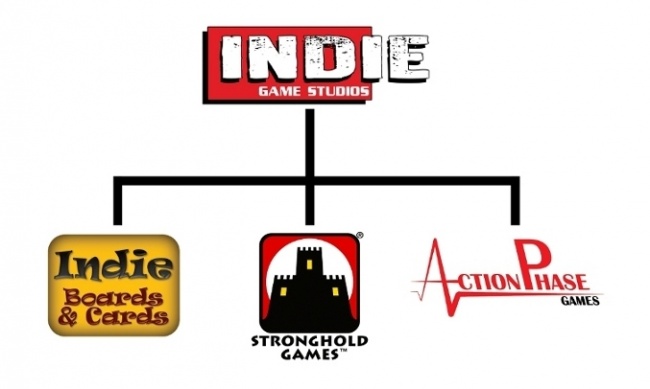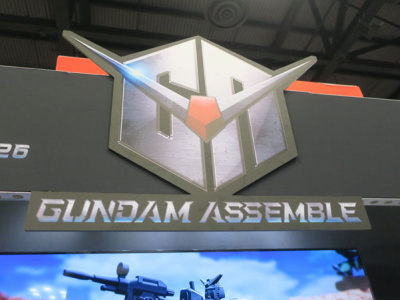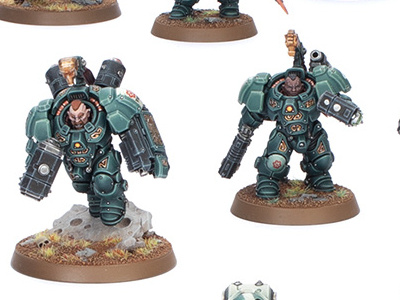We caught up with Stephen Buonocore, President of Stronghold Games and spokesperson for the newly formed Indie Games Studios, to discuss the merger that created the new company and plans for the future (see "Stronghold Games and Indie Boards & Cards Merge").
ICv2: So we understand, what was the nature of the transaction? What form were the companies?
Stephen Buonocore: The new entity owns the two companies. The entity of Indie Game Studios essentially acquired both Travis' [Worthington of Indie Boards & Cards] company and my company. One business, but the companies, the brands will operate independently of each other.
Who owns the new company?
It's owned by both Travis and I. By the way, Travis is Travis Worthington of Indie Boards & Cards. He had acquired Action Phase Games in 2016 and saw a good opportunity to continue an expansion of his company with the very strong brand of Stronghold Games, to bring that into the fold.
Some other company calls them imprints. I like the word "brands." Each one of those brands will be operated, at least from a nitty‑gritty, day‑to‑day basis, as separate channels to bring games to the market.
We will integrate some of the back-end functions, of course, over time, but the brands themselves will maintain separate brand identities and we will differentiate those brand identities even to a greater degree as we move forward.
Do the different studios have different game categories or genres that they specialize in?
The short answer is ‘yes,’ and we’ll see even more of that as we go forward. Indie Boards & Cards has been known, for the longest time, for smaller card games. Obviously, their core brands, their core products with The Resistance, and Avalon, and Coup are very small games, but they have sold extraordinarily well into the marketplace.
Action Phase Games has done many more thematic games. They continue to excel at that.
Stronghold Games has done a very wide spectrum of games, from the smallest, lightest all the way to the biggest, hundred‑dollar games. We have really made a big mark in the industry by going overseas, going to Europe, and finding great games in Europe, some in Asia as well, that did not have distribution across the rest of the world, bringing them here, rebranding them under Stronghold Games, and then getting them back out to the world.
You're going to see a lot more of that happen in the Stronghold Games catalog. Indie Boards & Cards will focus on the smaller games; and Action Phase on the more thematic, American‑style games.
How many releases would the two companies have released separately in 2018? Is that going to change in 2019? Are you ramping up or cutting back?
Stronghold had 26. I can't tell you exactly the number that Indie Boards & Cards and Action Phase did. I do not have their figures in front of me.
As an aggregate for all the companies, we're certainly not going to scale up numbers of games because the market right now is quite saturated in total number of products. What you're going to see is each of us focus on more of our core competencies and what the brands have stood for over time. In doing so, we're going to be pressing the marketing of those games to a very high degree.
One of the first things we're doing is we are right now in search for a Director of Marketing. This is going to be, without a doubt, our first hire that we bring on. We have a number of very qualified people that we've already been talking to and we're going to continue to be talking to.
Before the transaction, where did the games for these companies come from, internal development versus licenses of externally developed products? How do you see that changing, if at all?
Stronghold was already at over about probably 85 percent or more externally licensed games. That's going to be approximately what we'll see going forward, if not even a higher percentage of licensed games. We have not done a lot of internal development work. We've moved mostly to the licensing games from great European and Asian publishers.
Indie Boards & Cards and Action Phase are exactly the opposite. They've done a little licensing, but most of their games have come from internal development. They'll either actually create the game in‑house, or they'll find great games from designers, either known designers or not‑known designers, bring them in, develop the games further, and then bring them out.
A lot of their games have been done, as you probably know, on Kickstarter. Stronghold has not done that, though of course, that mix can change now as well because now there is in‑house expertise in Kickstarter.
It was something that I didn't want to do for a number of reasons. The biggest reason is expertise in doing so and time management that it takes to actually run successful Kickstarters. It's quite an amount of time.
It sounds like, if anything, you'll extend use of Kickstarter over to the Stronghold side?
In a small way, in a selective way, I am sure that it will happen. We're already even talking about the first project where it might happen. Again, when you do 26 releases, or even 20 releases (just throwing out numbers for 2019), it's certainly not something that you're going to do for every one of the products. It doesn't make sense. You'll use Kickstarter in the projects and for the products that make sense. Kickstarter games tend to have a certain quality to them, certain extra enhanced production values, bling if you want to call it, that the gamers there are looking for.
The bulk of our games will stay in the traditional distribution model. The bulk of their games [Indie Boards & Cards will probably stay in the Kickstarter model. It'll be similar, but there'll be some crossovers between the two, from the models.
Does Stronghold still have its deal with Eggertspiele (see "Stronghold, Eggertspiele Announced Partnership")?
No. They were purchased by Plan B Games. We do not license and distribute their games any longer.
That illustrates some of the competition for content out there. Plan B isn't necessarily a larger company, but you also have competitors for content among some very large companies. How does this merger change your ability to compete for content or for games?
Larger companies bring a larger ability for other companies to want to deal with. Stronghold has already had a long line of companies that want to work with us.
From the perspective of worrying about the games coming in and getting more games, I never have that problem. We lost Eggertspiele. Fine. We gained Edition Spielwiese, another Germany company, where we did the Uwe Rosenberg puzzle trilogy. That's Cottage Garden, and Indian Summer, and now Spring Meadow coming out in September. These guys are brilliant. They're constantly working with great designers.
We are simply finding new companies to work with. There's no issue doing so. A larger company will even attract more of that type of partners who want to come and work with us. I don't see that affecting the models whatsoever.
The way that I look at it is that we're competing for mindshare of the gamers that are out there. We want them to focus on our brands. We want to increase the visibility of our brands and therefore the games within the brand. To do so, we're going to need more customer focus and more pushing of our brands via traditional and new forms of marketing.
This is really the way that we see competition. It's not like we both went after this given game. Sure, that happens occasionally. We both go after a given game. I don't get it. Someone else gets it.
If the competition isn't so much for content but for consumer dollars, how does the merger help you do that? How does having a bigger company help get more mindshare for your games?
The way to do that is marketing; like I said, the first thing we're doing is hiring a Director of Marketing. A smaller company, or several smaller companies, find it hard to have the role of Director of Marketing, where you have a full‑time person who's got a marketing background, who has run marketing programs either within or outside of the gaming industry, who can focus on this as 100 percent of their role to ensure that we are getting ourselves in front of more people.
That person and that function is going to have the greatest amount of focus of the combined entity that we can possibly put at it. You're going to see Stronghold and Indie Game Studios at more conventions, even ones that we haven't been at in the past. We've already signed up for several more of those.
You're going to see us at all of the trade shows. We have been going, but in a bigger presence and in a bigger way. Those ways of showing ourselves more to the gamer or to the retailer, depending on where we are, are the ways that we're going to be grabbing the attention of the rest of the people out there in the industry.
One of the things big companies have is resources. Now you're a bigger company. How does the merger affect the amount of capital available to invest in games and marketing and other initiatives?
It's the three Cs of financing in any company: it's cash, capital, and credit. Absolutely, 100 percent, having a company with the current volume of sales and now additional capital involved could only help the entire entity. The financing of your games is going to be easier. If you need to go out to get short‑term financing, it's easier because of the sales that you can prove to have been done over time by a combined entity of this size now. All of that leads to an easier way of smoothing out cash flow and being able to finance your operations in a much easier way.
What other plans do you have for the combined entity?
Besides the hiring that I mentioned for Director of Marketing, we're also going to be hiring for Production and Development Manager to add to Nick Little's group there. Nick was promoted to Vice President of Game Development.
We also have a very good possibility of moving into Europe in the not too distant future, establishing a presence there.
As with many things here, this is also a play for talent. Both Travis and I saw that there was lots of talent here that the collective group together could use to make the company even bigger and better. Overall, this is a good thing for all of us involved.
I believe it's a win for the industry as well. The long‑term view of the industry, in my opinion, is that we've had many, many, many publishers show up and now Asmodee consolidating. Consolidation in an industry, at some point, is the way to move to grow the company. That's exactly what we're doing here. We're going to become another company that is consolidating around talent and around brands. This will make us a big player in the future as we move forward.

Behind the Indie Boards & Cards - Stronghold Merger
Posted by Milton Griepp on September 4, 2018 @ 3:01 am CT
MORE GAMES
New 'Gunpla' Miniatures Game; Also, Reveals New Paint Line for the Game
August 4, 2025
Bandai previewed their new Gundam Assemble miniatures game at Gen Con 2025.
Along with an Updated Codex
August 4, 2025
Games Workshop will release a new Leagues of Votann: Combat Patrol , for Warhammer 40,000.
MORE NEWS
Showbiz Round-Up
August 4, 2025
The post-SDCC showbiz news is still spicy a week after the show's conclusion. It's time for another round-up!
Early Friday, Continued
August 4, 2025
We continue our coverage of San Diego Comic-Con 2025 with Part 2 of our photo galleries, showcasing photos from early Friday, the second day of the show.








